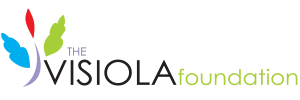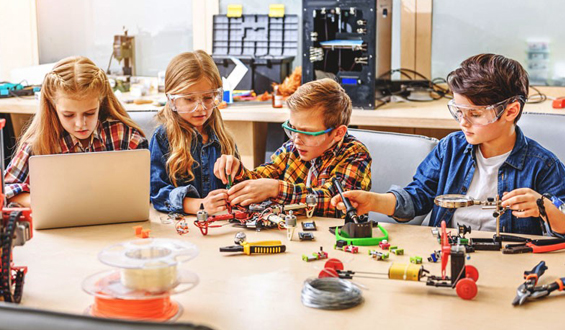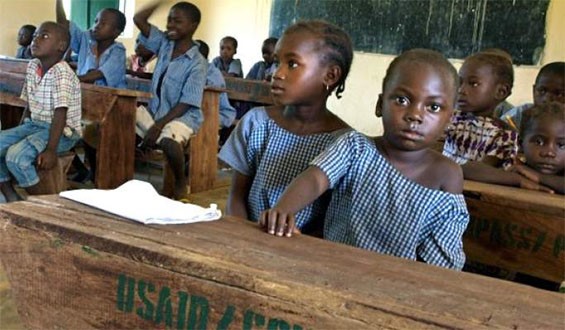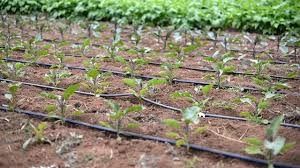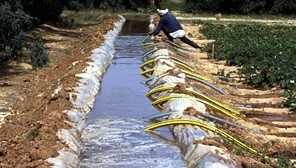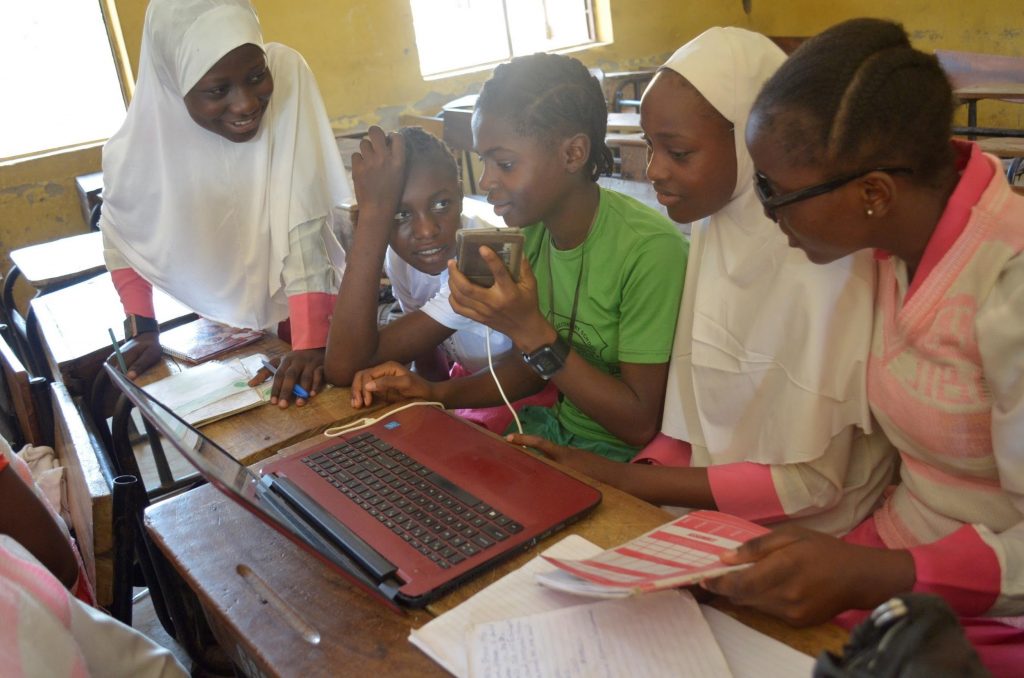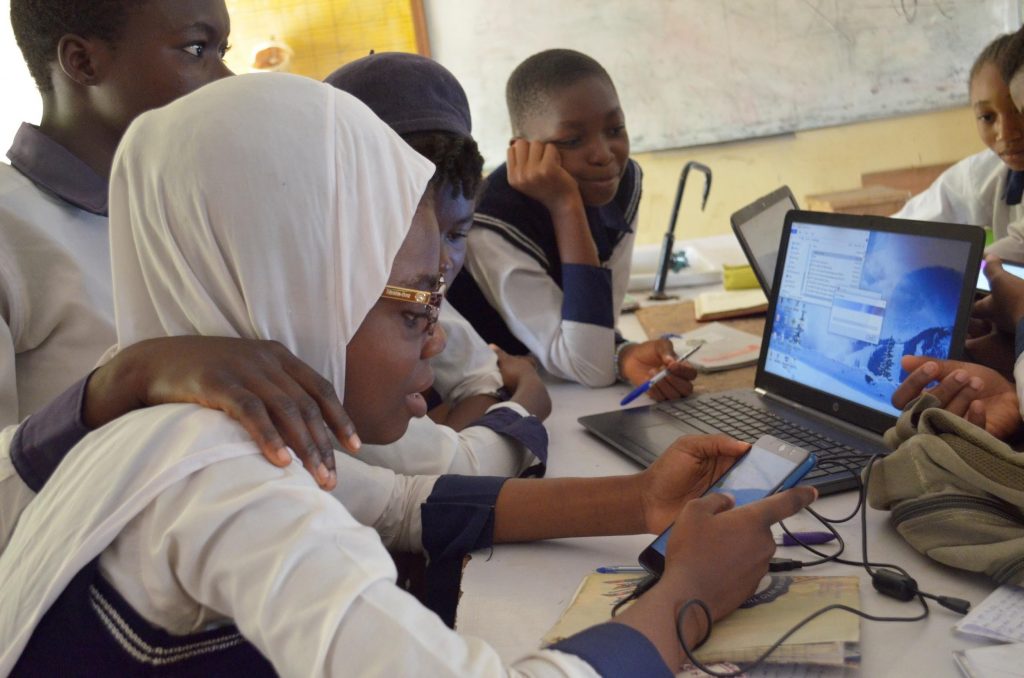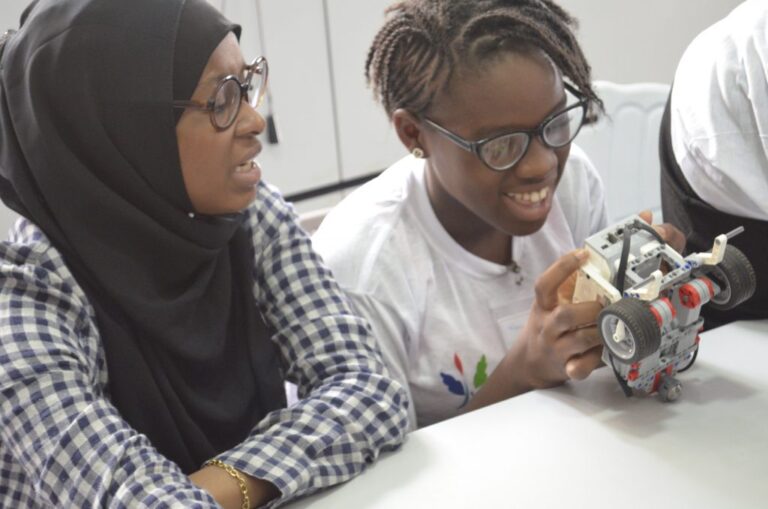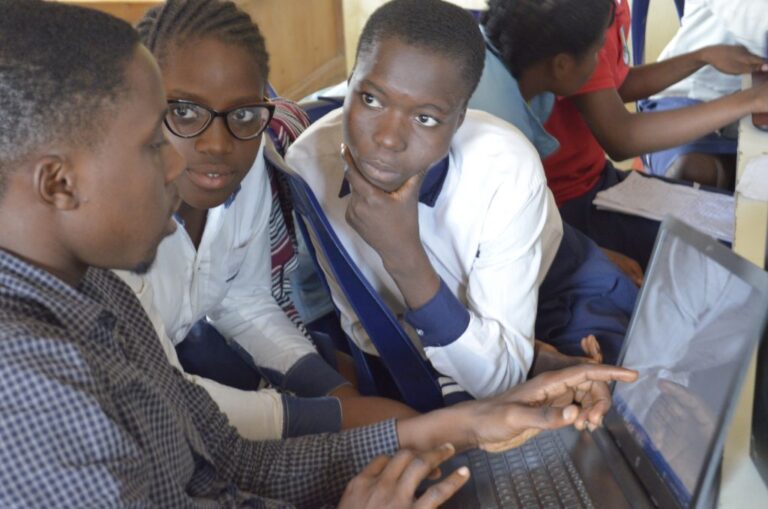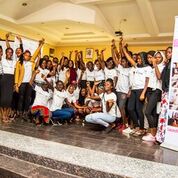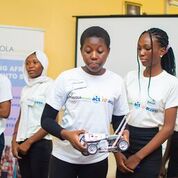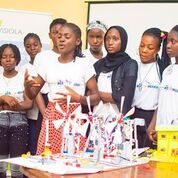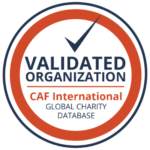the visiola foundation e-newsletter
Issue Q3, 2019
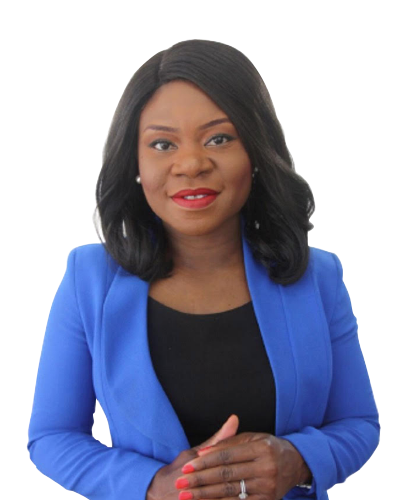
Ladé Araba
Founder and President of the Visiola Foundation
Founders' Corner
As artificial intelligence and machine learning sweep the global economy, we find innovations from the last century becoming increasingly obsolete. In fact, the world is changing so rapidly that almost every facet of human life has been disrupted – some more than others. Technology has revolutionized the way we communicate, undertake research, learn, interact with other people, work, travel, access healthcare, and enjoy leisurely activities.
According to a report published by Tech Nation,[1] the US is the global leader in technology investments, accounting for 49% (or $149 billion) of the capital raised by tech scale-ups over the last four years (Chinese scale-ups raised 20%). In artificial intelligence, the US, China, and the UK have raised over $40 billion, $15 billion, and $4 billion respectively, since 2010.
By contrast, African startups raised $169 million in 2018, according to WeeTracker.[2] Fintech was the primary recipient of these investments, followed by health-tech and agritech. In 2019, the World Economic Forum launched a new initiative – the Africa Growth Platform – to help startups across the continent transition to scale-ups that are globally competitive. In terms of Foreign Direct Investment (FDI), services accounted for 66% of investments, according to EY’s 2019 Africa Attractiveness Report.
While it is encouraging to see growing levels of investment in technology (primarily through FDI), the pace is much too slow. Moreover, local investors should ramp up their investments in technology and African governments should create strong enabling environments for a technological revolution. Unfortunately, the opposite is happening in some countries where government policies and regulations are effectively anti tech and innovation.
Imagination is the wellspring of creativity
Underpinning the rapid rise of the US, China, and the UK in technology is adequate investments in human capital. Basic education in each of these countries sufficiently equips students with foundational knowledge and skills for them to be labor market ready and for them to become innovators. Makerspaces and innovation centers dot their ecosystems, giving students a conducive environment in which to think, tinker, experiment, and collaborate to develop new products and services. In the UK, kids as young as five years old are sufficiently educated and inspired to build mobile applications. In Africa, the quality of education remains poor, producing weak outcomes. African countries continue to allocate on average 5% of GDP to education and not much of that is technology driven. Furthermore, most students don’t have access to the types of labs, Makerspaces, and innovation centers that are prevalent elsewhere. Kids’ imagination is therefore largely unstimulated. They don’t have the ability to imagine a technologically advanced world because they haven’t even seen basic services at work. This needs to change.
Strategic investments are required to equip all public schools at both the primary and secondary school levels with state-of-the-art science and computer labs, and with a revamped curriculum that inspires creativity and innovation. Teachers must themselves be up-skilled. And these investments cannot be limited to urban areas. They must be deployed en masse to rural areas where the majority of the population lives. As well, universal basic education must become a reality. UNESCO published a report in 2013 stating that 11 million children in Nigeria were not in school and will likely never receive a formal education. They are a ticking time bomb! They must urgently be identified and must receive a robust basic education that prepares them for the jobs of the future, but that, more importantly, stimulates their ability to innovate.
Africa is being left behind
This is even more worrying given the rapid pace of industrialization in other regions. To borrow from Oren Harari’s quote, while Africans are making incremental improvements to the “candle,” the rest of the world has moved onto the light bulb, and continues to innovate electricity supply and energy systems. Given the limited investments in high quality education and technology across the board, the “innovations” that are emanating from the region are often incremental and are only able to solve the problems of the last century. Moreover, because the majority of students are not being equipped with critical thinking and problem solving abilities, they are not creating the scale of innovative solutions as their foreign peers. A case-in-point is the uptake of agriculture as a pathway to prosperity. However, investments in this sector continue to focus on incremental improvements to the productivity of smallholder farmers, and “moving up the value chain” into agro-processing. Critically, there isn’t as much focus on investing in creating agriculture technology that can fundamentally disrupt the sector in Africa. We are yet to see solutions like drip irrigation technology (which was developed by Simcha Blass and Kibbutz Hatzerim in 1959) being widely adopted. No one has developed, patented, or expanded such a solution to address this basic but critical challenge facing the region’s smallholder farmer-led, rain-fed agriculture. Especially as Africa is the region most adversely affected by climate change.
Concrete investments are required by African governments and local investors to drive a technological revolution on the continent. I believe that this is what will enable the region to participate in the fourth industrial revolution. Without such concerted efforts, the continent will be left behind and may not be able to catch up with the rest of the world. By leading investments in these areas, local actors can help to attract even greater volumes of FDI into technology that can enable the numerous start-ups to truly scale and become globally competitive.
We had a very engaging third quarter. Students in our STEM Leadership and Entrepreneurship Program for Girls (STEMLEG) demonstrated their growing tech prowess through their strong performance in external science and technology competitions. Others graduated at the top of their class and gained admission to university to pursue STEM degrees. Coding Boot Camp participants secured internships and jobs, and our scholars completed engaging internships.
It is our delight to share these updates with you.
Warm Regards,
Ladé
[1]https://technation.io/report2019/#11-scaleup-investment
[2]https://weetracker.com/2018/07/02/african-startups-raised-usd-168-6-mn-in-h1-2018-weetracker-report/
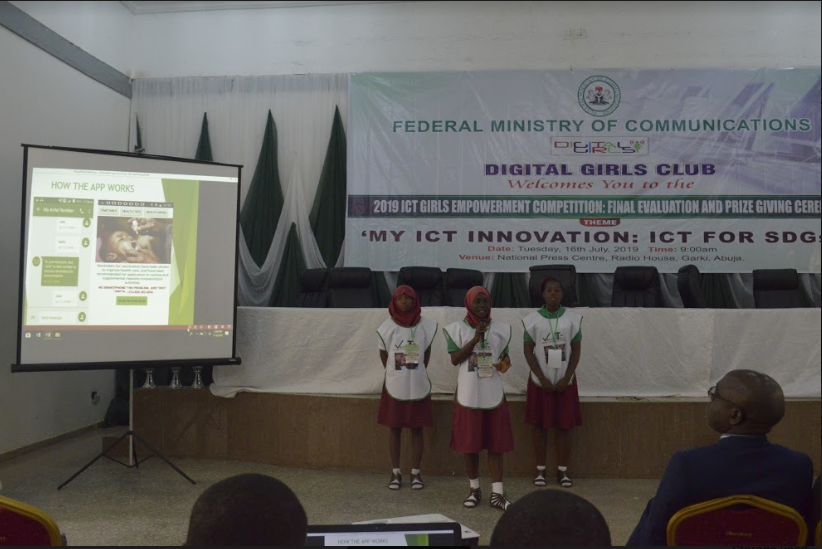
STEMLEG Students at the 2019 National ICT for Girls Competition
STEMLEG STUDENT TEAM EMERGES 2ND RUNNER UP AT 2019 NATIONAL ICT FOR GIRLS COMPETITION
Students from our STEM Leadership and Entrepreneurship Program for Girls (STEMLEG); which the Visiola Foundation runs in 20 Government Secondary Schools in Abuja, were invited by the Federal Ministry of Communications to participate in their ICT for Girls competition on July 15th. One of our schools emerged 2nd Runner Up and was awarded the sum of N200,000 ($560) for the school and N90,000 ($250) for the students. Below is a summary of the technology solution developed by the team.
VaccTick Mobile App provides mobile health services related to immunization and vaccination schedules. It sends reminders to parents on when to get their shots and tracks the number of children vaccinated. The app shows the list of hospitals closest to the users’ address and provides general health information.
“Throughout the STEMLEG program in my school, I realized that there is so much we can do with technology to assist, and solve problems in the society. It has been fun and educative and I look forward to learning and building more projects in the club.” – Habiba (15)
“I can change the world by building projects that solve critical needs in my community. I feel powerful.” – Wasila (16)
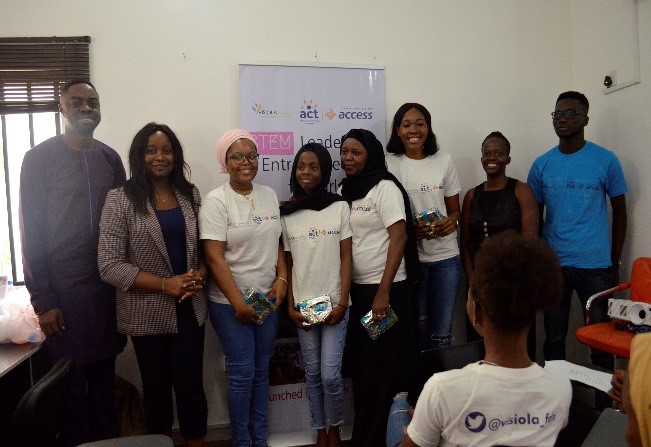
Students at the 2019 Summer Coding Boot Camp
SUMMER CODING BOOT CAMP GRADUATES 19 YOUNG WOMEN
The Foundation marked the conclusion of its intensive five-week Coding Boot Camp with a competition on Friday, August 9, 2019. Nineteen young women graduated from the program; which taught them the fundamentals of computer programming, including logic and reasoning, Data Structures, Algorithms, Full Stack Web Development, Python, and UI/UX design.
The students built their own portfolio websites. They also built a NodeJS-based grade management system, robust temperature converter, an optimized search algorithm for mobile phones, responsive e-commerce websites, and queue management systems. They learnt version control using GitHub and effectively worked remotely using GIT.
At the end of the boot camp, the Foundation organized a competition among the participants to demonstrate what they had learnt. Student teams built a platform that connects investors to farms, an E-commerce site that sells various products, a web application for a micro-finance bank and a healthcare management application that manages doctors’ schedules and allows doctors to conduct video consultations with patients on the web app. They pitched their projects to a panel of judges, including Chioma Agwuegbo (Founder, TechHer Ng); Oluwasegun Oderinde (Team Lead, Codelabs); and Simi Olusola (Founder, Abocoders).
Two of the graduates were subsequently offered internships with the HNG Internship and with Decagon.
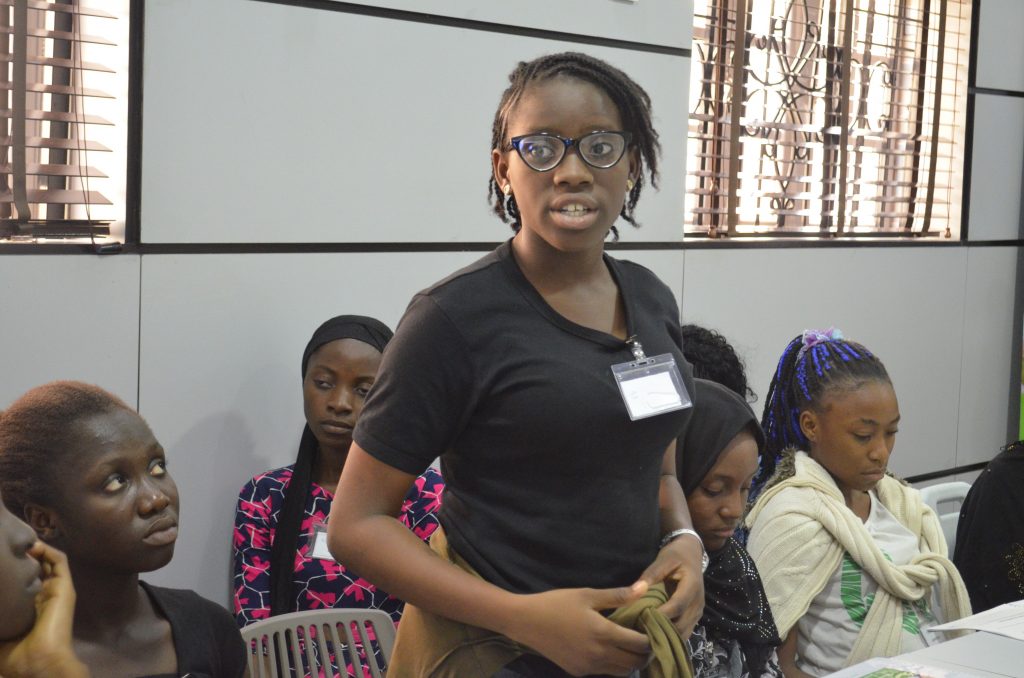
Grace at Schneider Electric
CBC GRADUATE GAINS ADMISSION TO STUDY COMPUTER SCIENCE
Grace, (15) graduated from the 2019 Coding boot camp and STEM Summer camp, and recently gained admission to study Computer Science. She shares her story below.
I started my second year of senior secondary school in 2017 and was selected to join the After School STEM club for girls organized by the Visiola Foundation. We learnt about robotics and mobile app development.
In 2018, I was selected to join a group of five girls to participate in the 2018 Technovation Challenge for girls. We created a mobile app called AgroEasy – an app that connects farmers to consumers and processing companies. We didn’t make it past the second stage and we were so disappointed and discouraged but our mentors from the Foundation kept encouraging us. A while after, we participated in the 2018 inter-school competition. It was a competition between 15 Government secondary schools in Abuja. We emerged winners of the competition and we were so happy and proud of ourselves. Our parents and school were also proud of us.
During the summer, I attended the 2018 STEM summer Camp for teen girls where we learnt about renewable energy. At the end of the camp out we were assigned group projects and my team came first with our robotic trash collector and sorter. During the Christmas break, we went on a Discovery tour to Schneider Electric’s offices and factory in Lagos as part of our reward for winning the STEM Camp competition. I was unconsciously building a very strong interest in science and technology.
After the completion of my senior secondary school examination in 2019, I attended the Visiola Foundation’s Coding Boot Camp where we learned full stack Web development, Python and Graphic Design. A few days after the camp, I went for my university’s screening and interview. During the interview, the lecturer asked me some questions and I mentioned that I had some knowledge on web development so he switched the questioning to Web development and I passed the test. I received my admission letter a few days later and now I am a computer science student at Bingham University.
I am so proud to be a STEM Girl who has participated in the three program areas of the Visiola Foundation over the last two years. I have grown personally, I feel more confident in myself, and I have learnt so much thanks to the Foundation. I am really grateful for how you have helped me to mold me into the young woman that I am today. I cannot wait to become a Computer Scientist.
Thank you for investing in me!
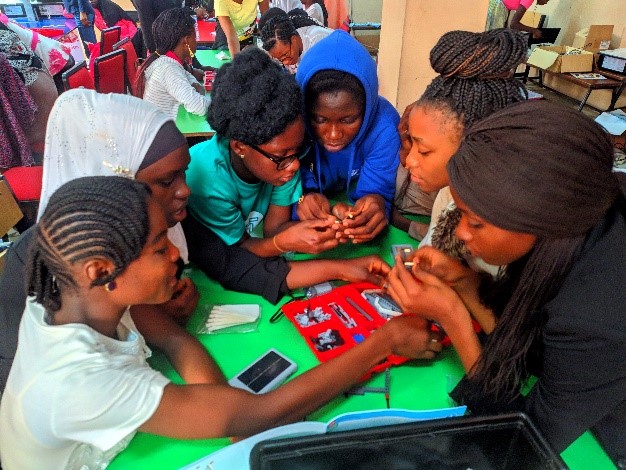
Students at the 2019 STEM Summer Camp
43 TEENS PARTICIPATE IN 2019 STEM SUMMER CAMP
The 2019 STEM Summer Camp for Teenage Girls took place on August 17 – 24 in Abuja.
The camp was themed, “A Renewable Future” and exposed students to the diverse renewable energy options available in Nigeria, while helping them to understand how to harness this potential for economic growth and development.
The summer camp comprised engaging classroom coursework, practical team activities, stimulating games, and a group project. Students learnt how to build renewable energy sources such as wind turbine, solar lawn mower, hand generator, moving sign boat pulley, motorized fan and court light system. They were also taught basic concepts in computer programming, science and math behind each project and engineering, all while having fun!
In addition, they were able to nurture and express their artistic skills through the drama program that they conceived, developed, and presented. We additionally worked to strengthen their self-confidence and self-esteem through a professional Self-Defense Training Program; where they learnt how to physically protect themselves against attacks and assault.
Furthermore, the camp exposed students to professionals in the STEM fields including Dr. Esu Ozak (Young Woman Engineer of the year 2017) and Mr. Seun Solesi (President, Anova Logistics, LLC) who shared their journey into STEM and presented insights on building a successful career in STEM. Students also learnt from an educational visit to Blue Camel Energy, a Renewable Energy Company in Abuja, where they were able to see diverse solar products used by residential customers, and where they asked questions to experienced engineers.
At the end of the camp, the students were divided into five groups that built the following projects: a solar-powered house, a wind farm, a solar-powered robotic lawn mower, a wind powered pulley system, and a solar-powered robotic pulley.
“This camp has been inspiring. I learnt the various ways in which renewable energy can provide solutions to power problems in my country” – Glory (17)
“I learnt how to make machines that were powered by renewable energy sources. I felt great.” – Amarachi (15)
“It was an awesome experience for me. I had the privilege of speaking with seasoned experts in the field of STEM, and that improved my confidence.” – Precious (15)
Watch the 2019 STEM Summer Camp video for highlights
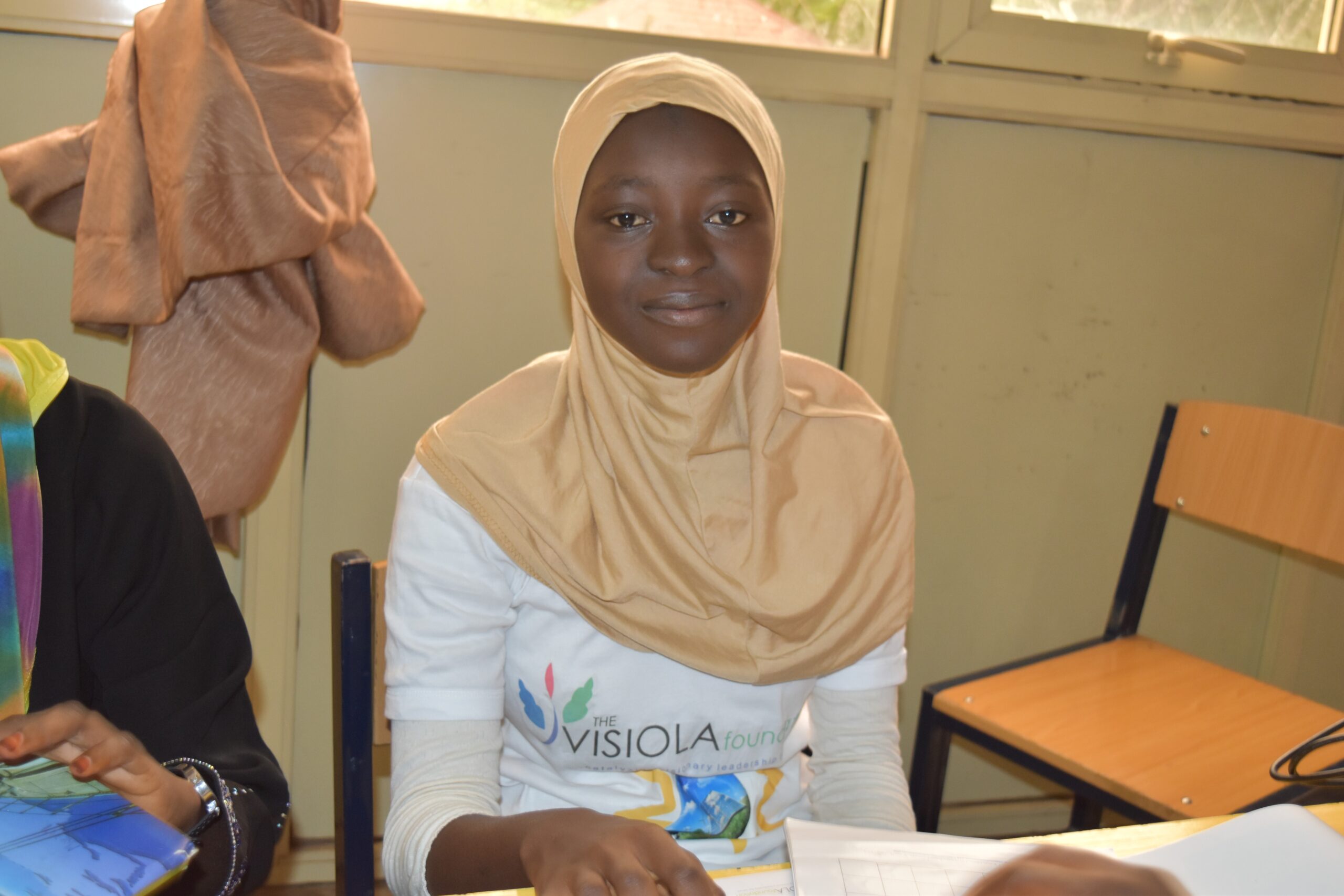
Baraka during the STEMLEG program
STEMLEG STUDENT EMERGES BEST GRADUATING STUDENT IN HER SCHOOL
Baraka (17), a STEMLEG participant, shares her growth experience with the Visiola Foundation over two years
My secondary school years were interesting, challenging and filled with many obstacles. However, I was able to get through it thanks to God, because I was determined, focused and always pushed ahead despite my challenges.
In school, I came across a group of proud and egoistic boys who believed that girls could not amount to anything and dealing with them on a daily basis was indeed a difficult task. Coming from a poor family background made my situation a lot more frustrating. I was sent home from school many times for not paying my school fees. On one faithful day, I spent the entire morning in the rain in front of my school gate because I had not paid my school fee but I refused to return home.
Judging from my nature, I find it very difficult to read at night so I had limited time to meet my daily target. As a result of this, I had to struggle harder, and many times, I stayed up at night and read with a dim torch light in the absence of electricity.
Throughout my stay in school, I was able to develop myself because for everything I got wrong, I tried my possible best to correct it and always tried to learn something new every day.
What I am most proud of was being able to bring the best out of other students by teaching them and making them believe in themselves.
Moreover, I also participated in several competitions within and out of the school where I won some and lost some. The Visiola Foundation was an immense contributor to my development. The After-School STEM Clubs for Girls at my school was life changing! I am very inquisitive and the clubs allowed me to ask questions and learn about science and technology in a way that I had never before experienced. I emerged the best overall student in the ASCG program among 15 government schools. That year I was also selected to participate in the STEM summer camp for teenage girls and it was another wonderful learning experience.
I am so pleased that I could prove those boys wrong and make my family proud. I am now paying it forward as a volunteer with the Visiola Foundation, while I await admission to university.
Finally, I am grateful to God and proud to say that I achieved all my targets despite all hurdles I had to cross. I had never attended any extra lessons since my parents could not afford it but I graduated with an excellent result. I always made sure to remember my purpose in life when I wanted to give up. Today, I am glad to say that on 30th July 2019 I was presented as the Overall Best Graduating Science Student at my school.
All I could say in my Mom’s embrace was “I MADE IT MOM”.
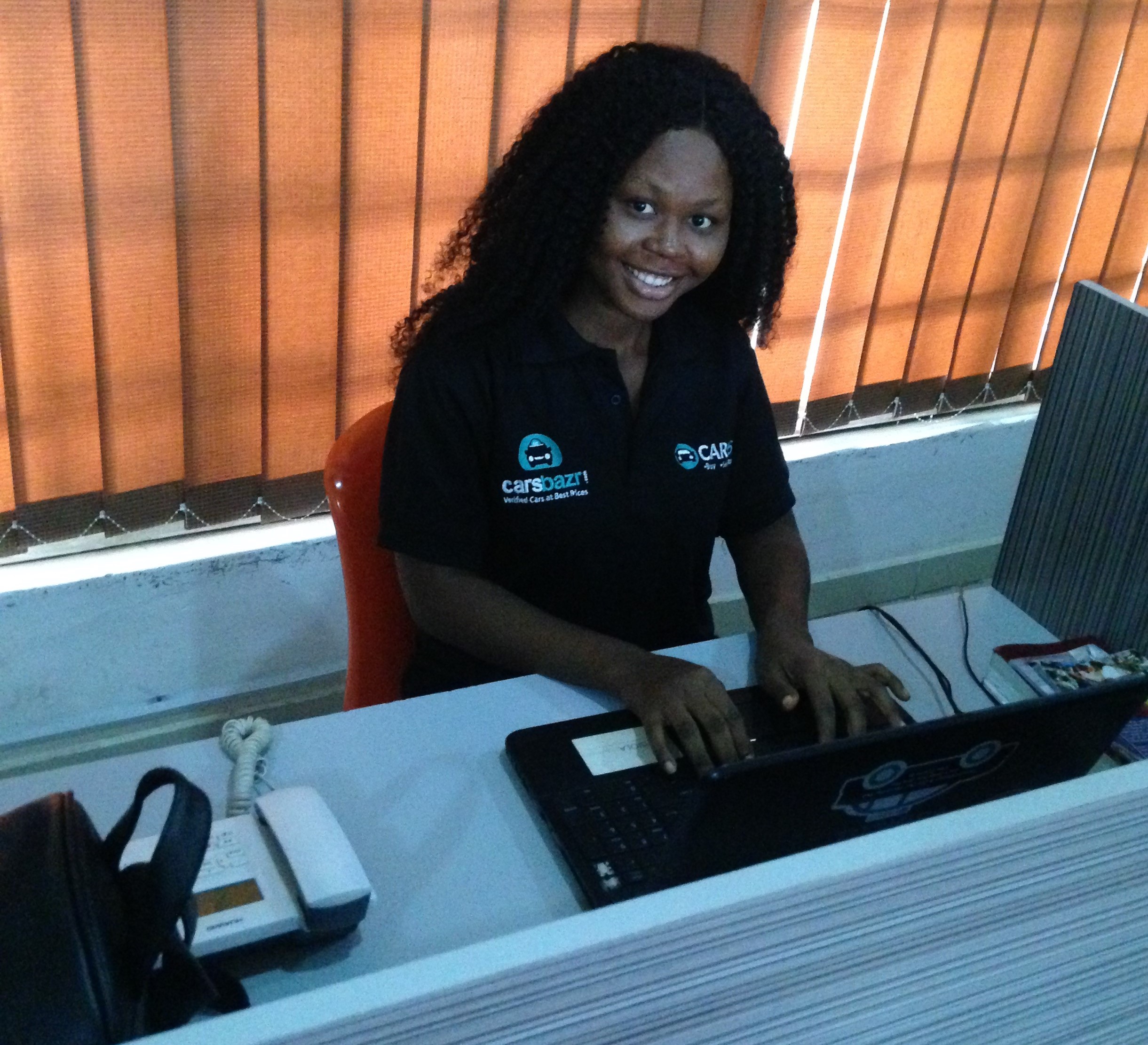
Mary at CARS45
2016 VISIOLA FOUNDATION SCHOLAR SECURES TECH INTERNSHIP WITH CARS45
Mary (21), a 2016 Visiola Foundation Scholar studying Computer Science and Electronics at Lead City University shares her recent internship experience.
I served as the customer service officer at the dealer resource center in Abuja, and I assisted in training new dealers, and organizing live auctions at the showrooms at least four times a week. I also called prospective dealers, shared information about the cars and live auctions and signed them.
My internship was very educative and interesting. I developed my customer service skills and further developed my problem solving skills. I received complaints from dealers and helped them with technical challenges they faced on the mobile application platform. My computer programming and mobile app development skills were useful and I was able to further hone these skills.
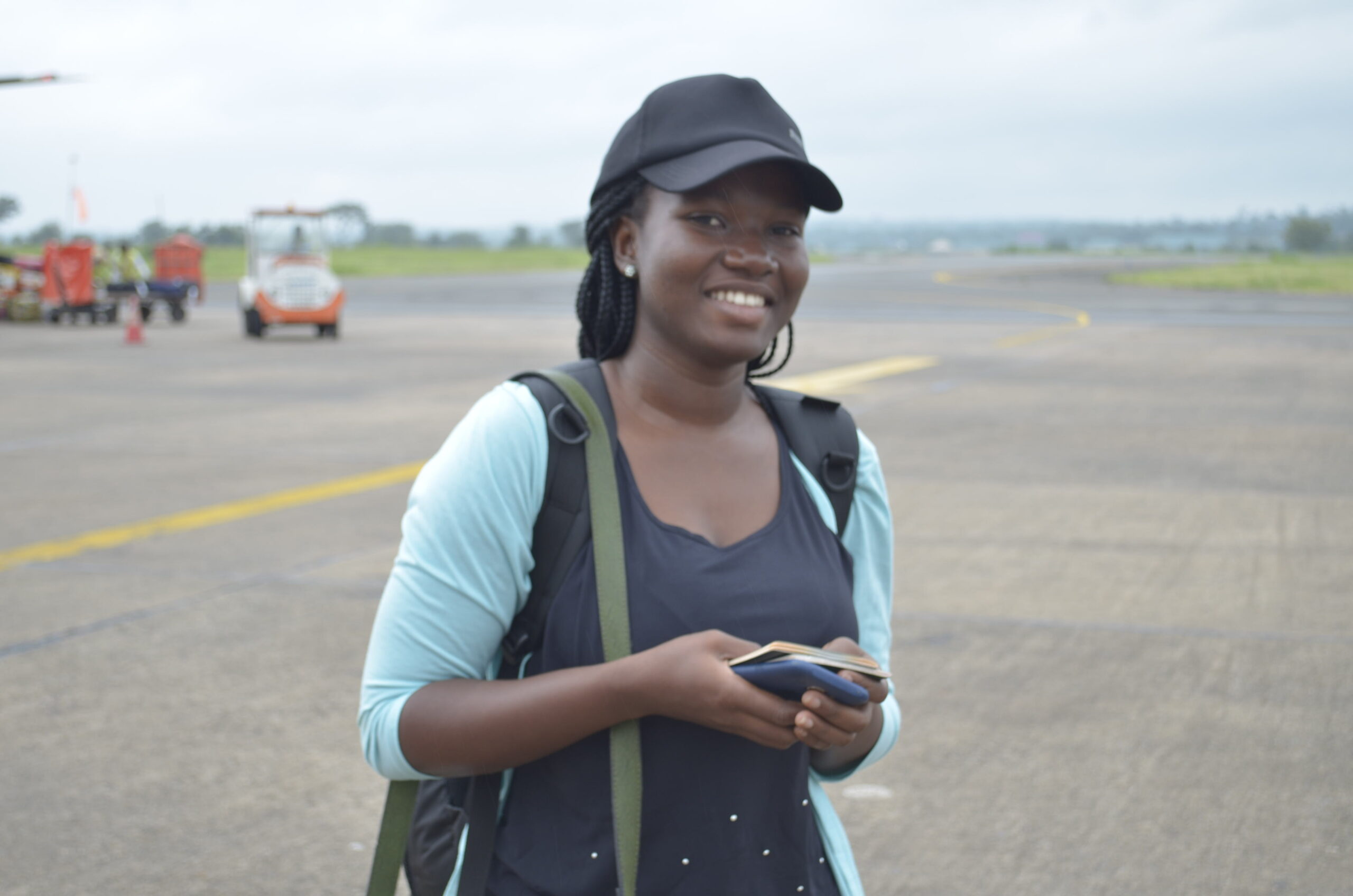
Edna
2016 VISIOLA FOUNDATION SCHOLAR COMPLETES SUMMER INTERNSHIP WITH POWER COMPANY IN ACCRA
Edna (21) shares her experience during her summer internship with Power and Co. Engineering Limited in Accra.
This summer, I did my internship with Power and Co Engineering Limited Ghana. This is a privately owned company that deals with the installation and servicing of generators, transformers, solar water heaters, fire and smoke detectors, and general electrical services. They also design and build Automatic Transfer Switches (ATS) and control panels that enable their customers to switch between their main source of power supply (ECG) and their auxiliary source of power supply (generator set).
During my internship, I joined a team of engineers who were working on a control panel for a soft drink processing company called Multi-Pac limited. Working on this project enabled me to relate some of the concepts I learned in some courses in school, such as Introduction to Electrical Machines and Advanced Electrical Machines with what we were doing in the field. The internship also gave me a foundational knowledge in one of the courses I am taking this semester (Power Engineering).
Furthermore, I was part of a team of engineers who were contracted to provide general electrical services for a new residential estate. During this project, I was in charge of contacting the Electricity Company of Ghana (ECG) for new electric meters for the apartments. Through this project, I got the opportunity to experience the processes involved in acquiring new electric meters while building strong business management, interpersonal, and negotiation skills. Often, I would follow-up and interact with customers and workers on various projects while preparing and reviewing invoices; which I had no idea about before the internship.
I had a wonderful experience during my internship as I further developed my knowledge in my field of study (Electrical and Electronics engineering) while honing my business management and administrative skills.
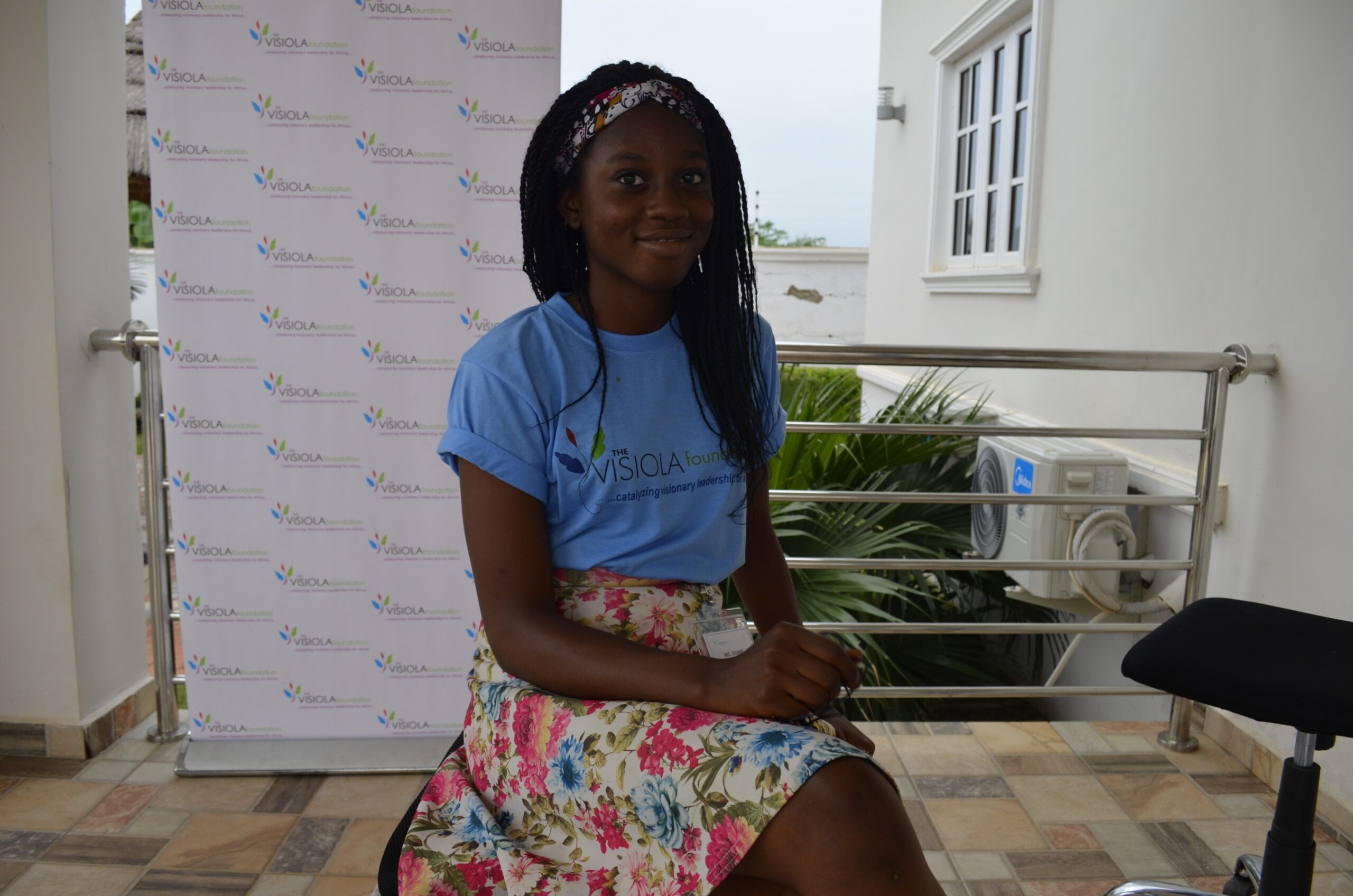
2016 Visiola Foundation Scholar – Divine
2016 VISIOLA FOUNDATION SCHOLAR COMPLETES CYBER SECURITY INTERNSHIP
Divine (18) shares her experience working with the Cyber Security Experts Association.
I greatly enjoyed my intensive four-month internship with CSEAN (Cyber Security Experts Association of Nigeria). It has always been my dream to work in the field of cyber security, securing information and systems from the hands of malicious people. This was a golden opportunity as I fulfilled my dream to work at a cyber security organization.
CSEAN aim is to create awareness of Information security best practices and acts as an agent of change to address cybercrime. I was assigned a virtual supervisor to oversee my activities and progress. We communicated through online platforms, I received study materials, links to online courses, and recommendations on the books to study. I studied the materials, took online courses and periodically sent my progress, feedback and screenshot of courses completed to my supervisor.
I acquired knowledge on the Information Security industry, cyber security methods, and best practices to help develop and improve security. Information security is important in addressing cybercrime in Nigeria. According to the IBM Cyber Security Intelligence Index Report; 95% of cyber security breaches are caused by human error. The best line of defense against cybercrime is training the public. It involves initial training for everyone and follows with security awareness initiatives to keep social engineering defenses fresh in everyone’s mind.
Also, I was responsible and reliable as I served as the admin of the association sorting out membership and other administrative functions. This was an opportunity to experience the professional world and gain insights on the soft skills needed to excel in the industry.
did you know
A child whose mother can read is 50% more likely to live past the age of 5 and twice as likely to attend school.
The cost of a 12-year education in the poorest countries ($1.17 per day) costs less than a loaf of bread or a newspaper.
Only 34% of girls in sub-Saharan Africa are able to complete lower secondary education, while 42% of their male classmates do.
Girls are almost 2.5 times more likely to be out of school if they live in conflict-affected countries, and young women are nearly 90% more likely to be out of secondary school than their counterparts in countries without conflict.
A dollar invested in an additional year of schooling, particularly for girls, generates earnings and health benefits of US$10 in low-income countries and nearly US$4 in lower-middle income.
Annual spending on education is estimated at US$4.7 trillion worldwide. Of that, US$3 billion (65% of the total) is spent in high-income countries and US$22 billion(0.5% of the total) in low-income countries, even though the two groups have roughly equal school-age populations.
Children who work for more than 43 or more hours per week can hardly find time to attend school. Indeed, less than 15% of them attend school.
If every girl worldwide received 12 years of quality education, lifetime earnings for women could increase by US$15 trillion to US$30 trillion globally.
With 21% of primary school-age children denied the right to education, sub-Saharan Africa has the highest rate of exclusion, followed by norther Africa and western Asia (11%) and Oceania (7%).
Source: UNESCO (2014); UNICEF; WHO; Savechildren.org (2013)
